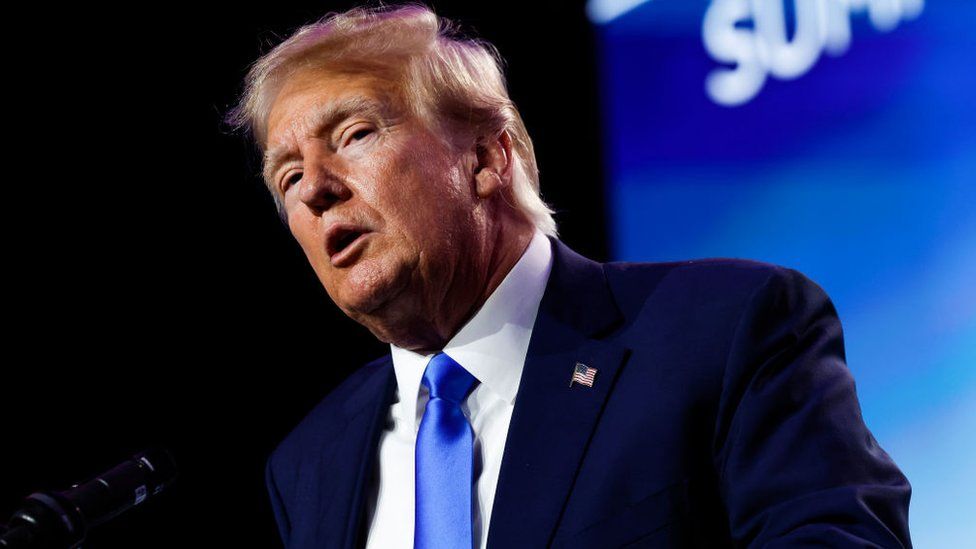
Trump abortion backlash spotlights a Republican balancing act

Mr Trump has called himself the “most pro-life president” in history
By Holly Honderich
in Washington
After Donald Trump labelled Florida’s six-week abortion ban a “terrible mistake”, he opened himself to attack from powerful conservative activists who want to ban the procedure nationwide. But his comments also revealed the challenges for Republican messaging on one of the country’s most polarising issues.
On Monday afternoon, the president of Students for Life sent an open letter to former President Donald Trump, the definitive frontrunner for the Republican party’s 2024 presidential nomination.
The tone was displeased, and scolding.
Students for Life would pause its $5m (£4m) door-knocking campaign meant to rally anti-abortion voters in the 2024 race until Mr Trump “clarified” his comments in a recent interview on NBC’s Meet the Press, which had aired the day before.
Mr Trump attacked his chief Republican rival, Florida Governor Ron DeSantis, for his state’s six-week abortion ban. The six-week ban “is a terrible thing and a terrible mistake”, he said.
But when pressed by host Kristen Welker on his own position, Mr Trump ducked. Would he support a 15-week federal ban – widely considered the minimum standard by anti-abortion groups? “I’m not going to say I would or I wouldn’t,” Mr Trump replied.
Marjorie Dannenfelser, president of the influential anti-abortion group SBA Pro-Life America, issued a statement saying anything later than a 15-week ban “makes no sense”. And Students for Life president Kristan Hawkins wrote her letter, threatening to pull her group’s 1,000 volunteers off the campaign trail.
“The pro-life vote is up for grabs,” Ms Hawkins said.
The tension between the anti-abortion lobby and Mr Trump is telling. More than one year after Mr Trump’s Supreme Court nominees helped deliver anti-abortion activists their long-sought victory – overturning Roe v Wade – Republicans are scrambling to find a position on abortion that placates their base without alienating the broader public.
Image source, Boston Globe
Experts say Republicans did not expect the public outcry that followed the end of Roe
For decades, popular opinion on abortion in the US has been relatively stable, with a majority of Americans supporting some legal access to the procedure, though many are open to restrictions later in pregnancy.
But among leading anti-abortion activists, the prevailing wisdom seemed to be that after Roe v Wade fell, the public would slowly adjust to the new legal reality, becoming more open to abortion bans.
“The law is the teacher,” Ms Hawkins told the BBC earlier this year.
Since the fall of Roe v Wade in June 2022, the opposite has proven true, said Greer Donley, a law professor at the University of Pittsburgh. After years of stagnation, polls are now showing slight shifts – with more Americans expressing support for abortion access. And in all six states that have held abortion-related ballot measures in the last year, abortion has won every time.
“I don’t think they [Republicans] were prepared for the public’s reaction… They’ve had to do a complete 180,” Ms Donley said. “Republicans are really struggling to figure out what to say.”
So far, the various members of the Republican field have tried different approaches to the problem, to varying effect.
“Their base, still, is predominantly anti-abortion. But in a general election, that is an extremely unpopular opinion to have,” Ms Donley said.
Nikki Haley, the former US ambassador to the UN who calls herself “unapologetically pro-life”, has attempted moderation, to straddle these two camps. At the Republican debate in August, Ms Haley said Republicans needed to “find consensus”, saying any federal ban would be unlikely to pass through US Congress.
“She was trying to be the voice of reason,” said Mary Ziegler, a law professor at the University of California, Davis, and a leading expert on the US abortion debate. But that type of appeal may have limited use for Ms Haley, who is polling nationally in the single digits.
Image source, BRENDAN SMIALOWSKI
No consensus on abortion has emerged among Republican candidates
Former Vice-President Mike Pence, arguably the most staunch anti-abortion advocate in the Republican primary right now, has gone the other way. At that same debate, Mr Pence criticised Ms Haley for failing to show “leadership” on abortion.
He pledged support for a 15-week federal ban.
“Mike Pence is trying to be the most anti-abortion candidate,” Ms Ziegler said.
But from the perspective of an anti-abortion activist, even Mr Pence’s position may be cold comfort.
Roughly 93% of all abortions in the country occur at or before 13 weeks of pregnancy, meaning the most anti-abortion position in the Republican presidential field only covers a small fraction of such terminations.
And now, even with his commanding lead of the Republican field, Mr Trump seems to be caught between his Republican base and the wider electorate, one he plans to win over in the general election next year.
I will “sit down with both sides”, Mr Trump said on Meet the Press, vowing – improbably – to find “peace on that issue for the first time in 52 years”.
“Trump’s general thesis seems to be that he’s going to win the Republican nomination no matter what he says or does,” Ms Ziegler said. And that hedging on abortion “is clearly a general election message, not a primary message”.
The next question, Ms Ziegler said, is what Mr Trump will actually do if he returns to the White House and no longer needs to court the general public. “Because then of course, he can’t get elected again… and that might lead him to do something more extreme.”
You may also be interested in:
Inside a US abortion clinic in its final days
Source: https://www.bbc.co.uk/news/world-us-canada-66850451?at_medium=RSS&at_campaign=KARANGA















